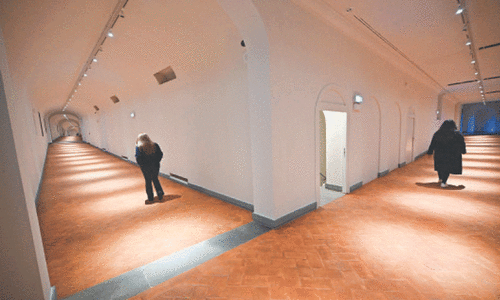RIZOKARPASO (Cyprus): It’s the butt of jokes and the source of choice curses, but the donkey is an integral part of Mediterranean culture, and friends on Cyprus are working to protect one of the world’s last wild colonies from extinction.
Using a Facebook group and email, hundreds of young Turkish Cypriots and a handful of Greek Cypriots have mobilised to “Save the Cyprus Donkey” after 10 of the rare brown animals were found shot dead at the end of March.
“The enemy of nature is the enemy of humans,” read a banner unfurled by a small group of demonstrators at a sandy beach near Rizokarpaso village on the panhandle of Cyprus that has for decades been a donkey sanctuary.
Deniz Direkci, a 20-year-old primary school employee who addressed the rally, said the main suspects in the unsolved donkey deaths were farmers angered by crop damage.
But fingers have also been pointed at hunters and developers eager to exploit the Karpas peninsula, one of the last unspoilt parts of a holiday island where construction is booming on both sides of a UN-patrolled Green Line.
The phenomenon is mirrored on the northwest coast’s Akamas peninsula, where plans for a national park are under threat and farmers have shot a number of moufflons, protected wild sheep.
As a small group of donkeys kept their distance on a hillside above the dunes, Aysun Yucel, 19, a law student from north Nicosia, was saddened and baffled by the killings.
“It’s so cruel. We used to come here for summer vacations and you would hear the donkeys passing by your bungalow as you slept. Now it’s sad, that doesn’t happen any more.” Begun Gulderem, 20, a Turk who has lived in Cyprus for the past decade, works for a construction firm.
“We don’t know why they are killing donkeys, or why people are burning forests. I want to know the truth,” she said.
Ironically, the Karpas donkey colony is a legacy of the 1974 Turkish invasion of the island’s northern third.
The vast majority of the area’s Greek Cypriot farmers fled south during the fighting, abandoning their animals.
And as agriculture declined amid the growing urbanisation, the “liberated” donkeys were replaced by tractors, pickups and SUVs.
As some 15 vehicles with peaceful eco-warriors formed a funeral procession to drive 50 kilometres to the site of the demonstration, farmers on tractors looked on bemused and little girls along the roadside sold posies of wild flowers to the mourners.Police were out in force, preventing non-Turkish Cypriots from playing any vocal part in the rally.
Writer and poet Jenan Selchuk said it was not just about donkeys, it was about preserving traditions and a way of life.
“They are bringing big electricity lines to the area, over which we have also held protests. They have development plans for luxury villas rather than any national park idea. As for the donkeys, they are seen as an obstacle to progress,” he said.—AFP














































Dear visitor, the comments section is undergoing an overhaul and will return soon.